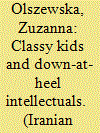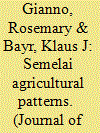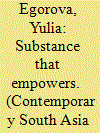|
|
|
Sort Order |
|
|
|
Items / Page
|
|
|
|
|
|
|
| Srl | Item |
| 1 |
ID:
133422


|
|
|
|
|
| Publication |
2014.
|
| Summary/Abstract |
This article examines the Japanese cat café boom, which peaked in 2009 yet remains a significant retail phenomenon throughout Japan, and in particular Tokyo. How do humans encounter animals in contemporary Japan, not as private owners and companions, but as consumers seeking direct, sensory engagement with cats at a moment of profound social and economic anxieties? Drawing on ethnographic fieldwork conducted in Tokyo, this article examines how cats have become a newly emergent commodity within the 'healing boom' that first emerged in recessionary-era 1990s Japan. Such healing commodities - therapeutic music, aromatherapy, robot interaction, among others - are designed to invoke an affective engagement with the consumer in order to cope with the uncertain and stressful conditions of life in still recessionary, and now post 3/11, Japan. I situate cat cafés within the increasing immaterialization of the economy in post-bubble Japan during which social relationships have become commodified and marketed to those who can afford it. Cats are the affective object through which patrons seek a sense of healing and relaxation.
|
|
|
|
|
|
|
|
|
|
|
|
|
|
|
|
| 2 |
ID:
124451


|
|
|
|
|
| Publication |
2013.
|
| Summary/Abstract |
This article reviews the ways in which class, status, social mobility and their cultural ramifications have been considered (or failed to be considered) in recent ethnographic studies of the Islamic Republic of Iran. It argues against the trend of privileging "resistance" to an oppressive state as a theoretical frame for documenting social phenomena in Iran: lifestyles and consumption patterns cannot be interpreted merely as signs of political rebellion because they are endowed with symbolic value as status attributes in a society whose class configurations are shifting. I present a number of sources and concepts that help to rethink these phenomena, and show how the experience of Afghan refugees living on the margins of Iranian cities illuminates both the opportunities and constraints created by the Islamic Republic's uneasy mix of political Islam, populism and neoliberalism. A focus on aspiration to upward mobility becomes a useful analytical lens that allows us to sidestep reductive dichotomies such as tradition/modernity or religion/secularism that are in practice blurred by its very pursuit.
|
|
|
|
|
|
|
|
|
|
|
|
|
|
|
|
| 3 |
ID:
089374


|
|
|
|
|
| Publication |
2009.
|
| Summary/Abstract |
What were the indigenous agricultural and population patterns in peninsular Malaysia's southern lowlands? What factors produced these patterns? Based on our analysis of ethnographic and historical evidence, as well as aerial photographs taken in 1948 in the Tasek Bera and Sungai Bera watersheds, the Semelai, an Orang Asli group, had a robust and productive subsistence agricultural system emphasising rice but insured by cassava. These photographs, from the P.D.R. Williams-Hunt Collection, provide an unusual record of Semelai agriculture prior to settlement in 1954 and contribute to our knowledge of indigenous economic patterns in the southern lowlands, which have received little ethnographic attention.
|
|
|
|
|
|
|
|
|
|
|
|
|
|
|
|
| 4 |
ID:
124959


|
|
|
|
|
| Publication |
2013.
|
| Summary/Abstract |
Drawing on two ethnographic examples of the sociocultural aspects of populations genetic research in India, the article explores in what ways tests aimed at assessing 'genetic differences' between populations can be viewed as enabling or disempowering for individuals, communities or nations subjected to such tests. The first builds on a response to DNA research demonstrated by the leaders of the Jewish Bene Ephraim community of Andhra Pradesh, a Dalit group who in the late 1980s declared their descent from the Lost Tribes of Israel. The second focuses on the Indian Genome Variation Consortium, a research network established in India in 2003 with the aim of mapping the country's human genetic diversity. Building upon Prainsack and Toom's theoretical concept of situated dis/empowerment, I suggest that in both case studies empowering and disempowering elements of DNA testing appear to co-constitute and co-produce each other, as they both reinforce reductionist accounts of human sociality and serve as rhetorical tools for social and political liberation.
|
|
|
|
|
|
|
|
|
|
|
|
|
|
|
|
| 5 |
ID:
131701


|
|
|
|
|
| Publication |
2014.
|
| Summary/Abstract |
This article addresses the problématique of the subject and the subject-object dichotomy from a post-objectivist, reflexivist perspective informed by a 'strong' version of reflexivity. It clarifies the rationale and epistemic-ontological requirements of strong reflexivity comparatively, through a discussion of autoethnography and autobiography, taken as representatives of other variants of reflexive scholarship. By deconstructing the ontological, epistemic, and reflexive statuses of the subject in the auto-ethnographic and auto-biographical variants, the article shows that the move from objectivism to post-objectivism can entail different reconfigurations of the subject-object relation, some of which can lead to subjectivism or an implicit positivist view of the subject. Strong reflexivity provides a coherent and empowering critique of objectivism because it consistently turns the ontological fact of the social situatedness of knowledge into an epistemic principle of social-scientific research, thereby providing reflexivist scholars with a critique of objectivism from within that allows them to reclaim the philosophical, social, and ethical dimensions of objectivity rather than surrender them to the dominant neopositivist tradition.
|
|
|
|
|
|
|
|
|
|
|
|
|
|
|
|
|
|
|
|
|